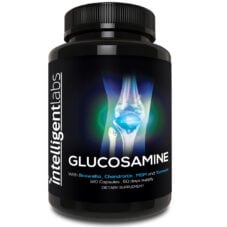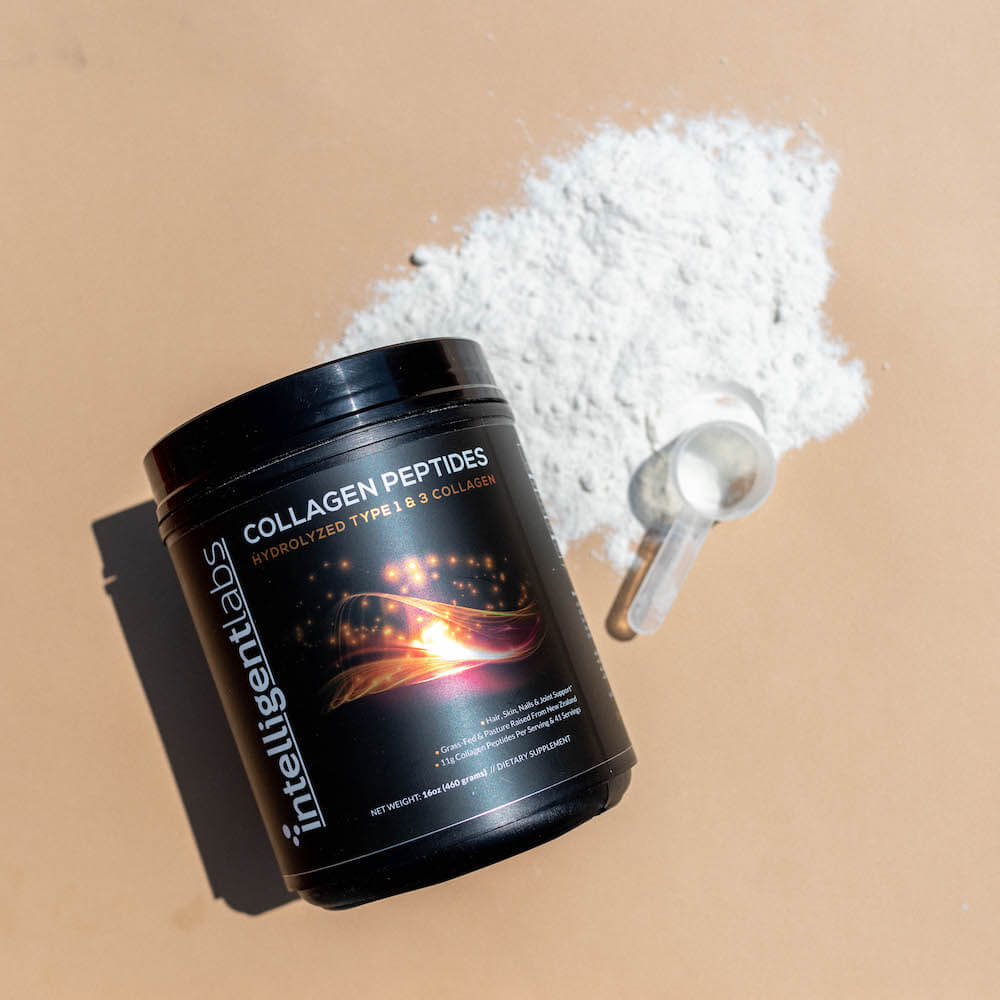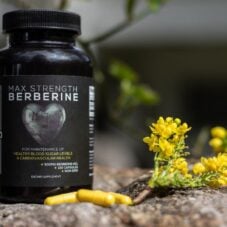-
×
 Glucosamine with Chondroitin and MSM
1 × $24.99
Glucosamine with Chondroitin and MSM
1 × $24.99
Nutrition
Collagen for Men: Boost Skin, Joints, Muscle & Hair!
“Lustrous hair, radiant skin, thicker nails…” Collagen is often marketed as a beauty supplement, making it seem like something only women need. But here’s the truth – collagen is essential for men, too.
Far from being just a “vanity” supplement, collagen is a foundational protein that keeps your body strong from the inside out. In this post, we’ll break down eight science-backed reasons why guys should consider taking collagen everyday!
Table of Contents
What are the health benefits of collagen for men?
Here’s how adding our Collagen Peptides to your daily routine can help keep you strong, active, and healthy:
1) Collagen is great for men’s skin
As the most abundant protein in the human body, the benefits of collagen supplements work the same way in both sexes; this includes its positive effects on skin.
While both men and women experience collagen loss over time, collagen production slows down in your 20s, causing the dermis (middle layer of the skin) to weaken. This leads to wrinkles, sagging skin, and a loss of elasticity.
The good news? Studies show that collagen supplementation can boost skin elasticity, hydration, and overall skin density.1
2) Collagen may support faster wound healing
Wounds don’t just heal on their own. Your body goes through three crucial phases: inflammation, tissue repair, and remodeling. When collagen levels are low, the healing process can stall, leading to slow recovery, chronic wounds, and a higher risk of infection.2
Fortunately, there is evidence that collagen-treated wounds close faster and are less likely to reopen.3
Moreover, a recent review of 11 studies with 961 patients also found that collagen dressings heal chronic wounds more effectively than standard treatments, with no added risks.4
3) Collagen supports gut health and digestion
Collagen is a key component of the gut lining, helping with nutrient absorption and digestion. When gut inflammation occurs (like in irritable bowel disease or leaky gut syndrome), collagen levels drop, weakening the gut barrier.5
Taking collagen can help repair and strengthen the gut lining, reducing inflammation and improving digestion.6
Some of collagen’s key amino acids also offer extra gut benefits:7 8
- Glutamine – Strengthens the gut barrier
- Glycine – Reduces gut inflammation
- Histidine – Protects against oxidative stress
- Threonine – helps with intestinal healing
4) Collagen helps strengthen men’s bones
Bones aren’t just made of minerals like calcium, they also rely on collagen for structure and flexibility. While calcium gives bones their hardness, collagen provides the framework that keeps them strong and resilient.9
As the years go by, bones naturally become more brittle and prone to fractures. While collagen supplements can’t completely prevent this, they may help lower the risk of fractures by maintaining bone strength.10
5) Collagen may offer joint pain relief

Strong bones and flexible joints go hand in hand. While calcium and vitamin D support bone density, collagen is the key structural protein that keeps cartilage strong and resilient. When collagen levels decline, cartilage wears down faster, leading to stiffness, discomfort, and joint pain.11
The good news? Collagen Peptides are highly absorbable and accumulate in cartilage. Research shows it may help reduce stiffness, relieve joint pain, and improve mobility, particularly in those with osteoarthritis.12 13
Regular supplementation may be a natural way to keep your joints healthy as you age.
6) Collagen may help reduce hair loss in men
If you’re noticing thinning hair or excessive shedding, collagen may help, especially if the cause is stress, poor nutrition, or illness.
Keratin, the protein that makes up hair, is built from amino acids, many of which are found in collagen peptides.14 Supplementing with collagen may support hair strength and growth by providing the nutrients your body needs.
However, it’s important to set realistic expectations. There’s no evidence that collagen can help with male pattern baldness (androgenic alopecia), a genetic condition affecting more than 50% of men over 50. But for general hair health and thickness, it may be worth adding to your routine.
7) Collagen may improve men’s muscle mass
Collagen won’t magically turn you from scrawny to jacked. But it can support muscle growth and recovery, especially when combined with resistance training.15
Research shows that collagen supplementation may improve body composition, increase muscle mass, and speed up recovery after intense workouts.16
However, if you’re aiming for maximum muscle growth, collagen shouldn’t be your primary protein source. Unlike whey protein, which contains all essential amino acids and higher leucine levels, collagen is an incomplete protein (it lacks tryptophan).17
That said, up to 36% of daily protein intake can come from collagen peptides while still meeting essential amino acid needs.17
8) Collagen supports men’s heart health
Your heart works nonstop, keeping you alive from day one. But poor diet and inactivity can lead to atherosclerosis, where plaque clogs arteries, raising the risk of heart attack and stroke.
Collagen helps because artery walls are made of collagen fibers. One study found that taking 16g of collagen daily for six months improved heart health, suggesting it may help prevent artery stiffening.18
Collagen also contains arginine, which converts into nitric oxide, a vasodilator that relaxes blood vessels and lowers blood pressure.19
Related article: How Much Collagen To Take For Best Results?
Ready to experience the benefits?
Give your body the support it needs with Intelligent Labs Collagen Peptides! We use only Types I and III hydrolyzed bovine collagen, carefully processed in our NSF GMP-certified facility in the USA. Plus, every batch is third-party tested, so you get nothing but the best collagen!
💬 Got questions or personal experiences with collagen? Leave a comment below – we’d love to hear from you!
📩 Want to learn more about collagen and men’s health? Sign up for our mailing list to get expert tips, product updates, and exclusive offers straight to your inbox.
References:
- Choi, Franchesca D. et al. “Oral Collagen Supplementation: A Systematic Review of Dermatological Applications.” Journal of drugs in dermatology : JDD vol. 18,1 (2019): 9-16. ↩︎
- Mathew-Steiner, Shomita S et al. “Collagen in Wound Healing.” Bioengineering (Basel, Switzerland) vol. 8,5 63. 11 May. 2021, doi:10.3390/bioengineering8050063 ↩︎
- Kumar, Manishekhar et al. “Hydrolyzed Collagen Powder Dressing Improves Wound Inflammation, Perfusion, and Breaking Strength of Repaired Tissue.” Advances in wound care vol. 13,2 (2024): 70-82. doi:10.1089/wound.2023.0065 ↩︎
- Shu, Hongxin et al. “The clinical efficacy of collagen dressing on chronic wounds: A meta-analysis of 11 randomized controlled trials.” Frontiers in surgery vol. 9 978407. 31 Aug. 2022, doi:10.3389/fsurg.2022.978407 ↩︎
- van Haaften, W T et al. “Misbalance in type III collagen formation/degradation as a novel serological biomarker for penetrating (Montreal B3) Crohn’s disease.” Alimentary pharmacology & therapeutics vol. 46,1 (2017): 26-39. doi:10.1111/apt.14092 ↩︎
- Graham, M F et al. “Collagen synthesis by human intestinal smooth muscle cells in culture.” Gastroenterology vol. 92,2 (1987): 400-5. doi:10.1016/0016-5085(87)90134-x ↩︎
- Cruzat, Vinicius et al. “Glutamine: Metabolism and Immune Function, Supplementation and Clinical Translation.” Nutrients vol. 10,11 1564. 23 Oct. 2018, doi:10.3390/nu10111564 ↩︎
- Sugihara, Kohei et al. “The Role of Dietary Nutrients in Inflammatory Bowel Disease.” Frontiers in immunology vol. 9 3183. 15 Jan. 2019, doi:10.3389/fimmu.2018.03183 ↩︎
- Tzaphlidou, Margaret. “Bone architecture: collagen structure and calcium/phosphorus maps.” Journal of biological physics vol. 34,1-2 (2008): 39-49. doi:10.1007/s10867-008-9115-y ↩︎
- Campos, Luana Dias et al. “Collagen supplementation in skin and orthopedic diseases: A review of the literature.” Heliyon vol. 9,4 e14961. 28 Mar. 2023, doi:10.1016/j.heliyon.2023.e14961 ↩︎
- Chang LR, Marston G, Martin A. Anatomy, Cartilage. [Updated 2022 Oct 17]. In: StatPearls [Internet]. Treasure Island (FL): StatPearls Publishing; 2025 Jan-. Available from: https://www.ncbi.nlm.nih.gov/books/NBK532964/ ↩︎
- Bello, Alfonso E., and Steffen Oesser. “Collagen Hydrolysate for the Treatment of Osteoarthritis and Other Joint Disorders:a Review of the Literature.” Current Medical Research and Opinion, vol. 22, no. 11, 10 Oct. 2006, pp. 2221–2232, https://doi.org/10.1185/030079906×148373. ↩︎
- García-Coronado, Juan Mario et al. “Effect of collagen supplementation on osteoarthritis symptoms: a meta-analysis of randomized placebo-controlled trials.” International orthopaedics vol. 43,3 (2019): 531-538. doi:10.1007/s00264-018-4211-5 ↩︎
- Yang, Fei-Chi et al. “The structure of people’s hair.” PeerJ vol. 2 e619. 14 Oct. 2014, doi:10.7717/peerj.619 ↩︎
- Kirmse, Marius et al. “Prolonged Collagen Peptide Supplementation and Resistance Exercise Training Affects Body Composition in Recreationally Active Men.” Nutrients vol. 11,5 1154. 23 May. 2019, doi:10.3390/nu11051154 ↩︎
- Clifford, Tom et al. “The effects of collagen peptides on muscle damage, inflammation and bone turnover following exercise: a randomized, controlled trial.” Amino acids vol. 51,4 (2019): 691-704. doi:10.1007/s00726-019-02706-5 ↩︎
- Paul, Cristiana et al. “Significant Amounts of Functional Collagen Peptides Can Be Incorporated in the Diet While Maintaining Indispensable Amino Acid Balance.” Nutrients vol. 11,5 1079. 15 May. 2019, doi:10.3390/nu11051079 ↩︎
- Tomosugi, Naohisa et al. “Effect of Collagen Tripeptide on Atherosclerosis in Healthy Humans.” Journal of atherosclerosis and thrombosis vol. 24,5 (2017): 530-538. doi:10.5551/jat.36293 ↩︎
- Wu, G, and S M Morris Jr. “Arginine metabolism: nitric oxide and beyond.” The Biochemical journal vol. 336 ( Pt 1),Pt 1 (1998): 1-17. doi:10.1042/bj3360001 ↩︎




